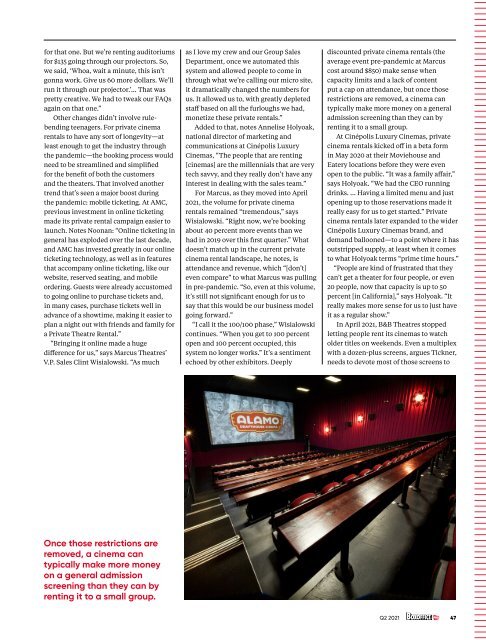Boxoffice Pro
Boxoffice Pro is the official publication of the National Association of Theatre Owners.
Boxoffice Pro is the official publication of the National Association of Theatre Owners.
You also want an ePaper? Increase the reach of your titles
YUMPU automatically turns print PDFs into web optimized ePapers that Google loves.
for that one. But we’re renting auditoriums<br />
for $135 going through our projectors. So,<br />
we said, ‘Whoa, wait a minute, this isn’t<br />
gonna work. Give us 60 more dollars. We’ll<br />
run it through our projector.’... That was<br />
pretty creative. We had to tweak our FAQs<br />
again on that one.”<br />
Other changes didn’t involve rulebending<br />
teenagers. For private cinema<br />
rentals to have any sort of longevity—at<br />
least enough to get the industry through<br />
the pandemic—the booking process would<br />
need to be streamlined and simplified<br />
for the benefit of both the customers<br />
and the theaters. That involved another<br />
trend that’s seen a major boost during<br />
the pandemic: mobile ticketing. At AMC,<br />
previous investment in online ticketing<br />
made its private rental campaign easier to<br />
launch. Notes Noonan: “Online ticketing in<br />
general has exploded over the last decade,<br />
and AMC has invested greatly in our online<br />
ticketing technology, as well as in features<br />
that accompany online ticketing, like our<br />
website, reserved seating, and mobile<br />
ordering. Guests were already accustomed<br />
to going online to purchase tickets and,<br />
in many cases, purchase tickets well in<br />
advance of a showtime, making it easier to<br />
plan a night out with friends and family for<br />
a Private Theatre Rental.”<br />
“Bringing it online made a huge<br />
difference for us,” says Marcus Theatres’<br />
V.P. Sales Clint Wisialowski. “As much<br />
as I love my crew and our Group Sales<br />
Department, once we automated this<br />
system and allowed people to come in<br />
through what we’re calling our micro site,<br />
it dramatically changed the numbers for<br />
us. It allowed us to, with greatly depleted<br />
staff based on all the furloughs we had,<br />
monetize these private rentals.”<br />
Added to that, notes Annelise Holyoak,<br />
national director of marketing and<br />
communications at Cinépolis Luxury<br />
Cinemas, “The people that are renting<br />
[cinemas] are the millennials that are very<br />
tech savvy, and they really don’t have any<br />
interest in dealing with the sales team.”<br />
For Marcus, as they moved into April<br />
2021, the volume for private cinema<br />
rentals remained “tremendous,” says<br />
Wisialowski. “Right now, we’re booking<br />
about 40 percent more events than we<br />
had in 2019 over this first quarter.” What<br />
doesn’t match up in the current private<br />
cinema rental landscape, he notes, is<br />
attendance and revenue, which “[don’t]<br />
even compare” to what Marcus was pulling<br />
in pre-pandemic. “So, even at this volume,<br />
it’s still not significant enough for us to<br />
say that this would be our business model<br />
going forward.”<br />
“I call it the 100/100 phase,” Wisialowski<br />
continues. “When you get to 100 percent<br />
open and 100 percent occupied, this<br />
system no longer works.” It’s a sentiment<br />
echoed by other exhibitors. Deeply<br />
discounted private cinema rentals (the<br />
average event pre-pandemic at Marcus<br />
cost around $850) make sense when<br />
capacity limits and a lack of content<br />
put a cap on attendance, but once those<br />
restrictions are removed, a cinema can<br />
typically make more money on a general<br />
admission screening than they can by<br />
renting it to a small group.<br />
At Cinépolis Luxury Cinemas, private<br />
cinema rentals kicked off in a beta form<br />
in May 2020 at their Moviehouse and<br />
Eatery locations before they were even<br />
open to the public. “It was a family affair,”<br />
says Holyoak. “We had the CEO running<br />
drinks. … Having a limited menu and just<br />
opening up to those reservations made it<br />
really easy for us to get started.” Private<br />
cinema rentals later expanded to the wider<br />
Cinépolis Luxury Cinemas brand, and<br />
demand ballooned—to a point where it has<br />
outstripped supply, at least when it comes<br />
to what Holyoak terms “prime time hours.”<br />
“People are kind of frustrated that they<br />
can’t get a theater for four people, or even<br />
20 people, now that capacity is up to 50<br />
percent [in California],” says Holyoak. “It<br />
really makes more sense for us to just have<br />
it as a regular show.”<br />
In April 2021, B&B Theatres stopped<br />
letting people rent its cinemas to watch<br />
older titles on weekends. Even a multiplex<br />
with a dozen-plus screens, argues Tickner,<br />
needs to devote most of those screens to<br />
Once those restrictions are<br />
removed, a cinema can<br />
typically make more money<br />
on a general admission<br />
screening than they can by<br />
renting it to a small group.<br />
Q2 2021<br />
47

















